Charles E W Bean, Diaries, AWM38 3DRL 606/244/1 - 1916 - 1933 - Part 10
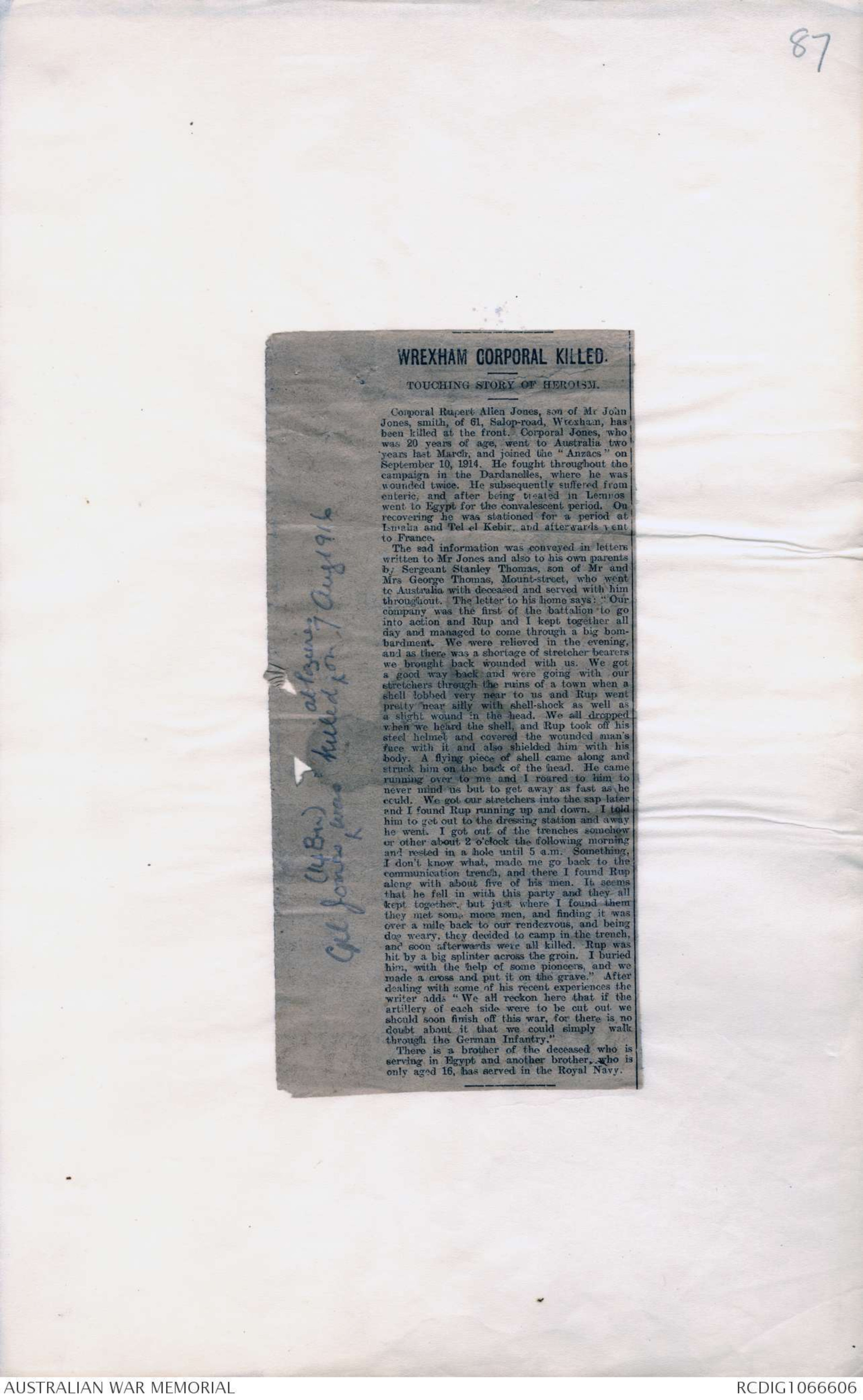
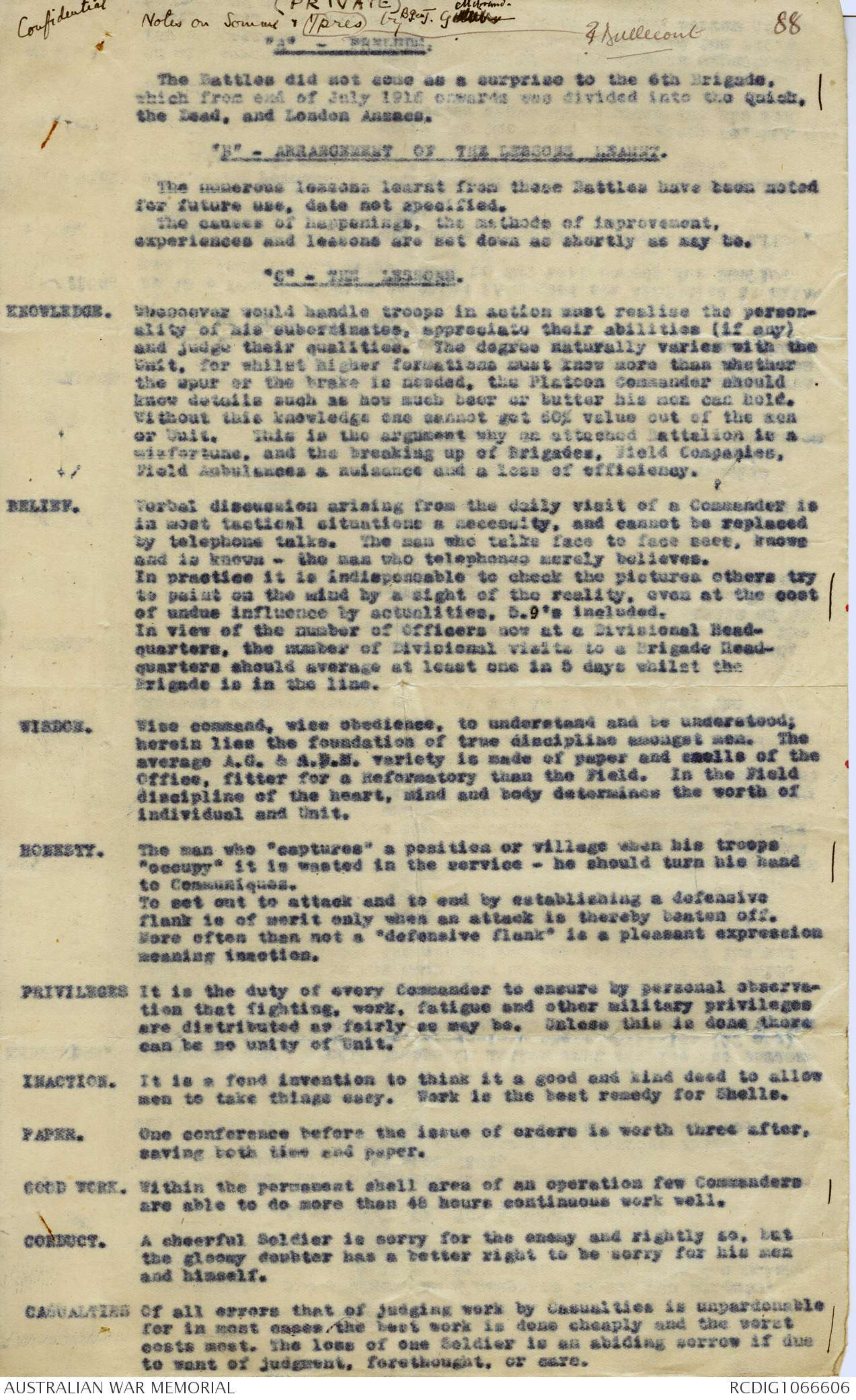
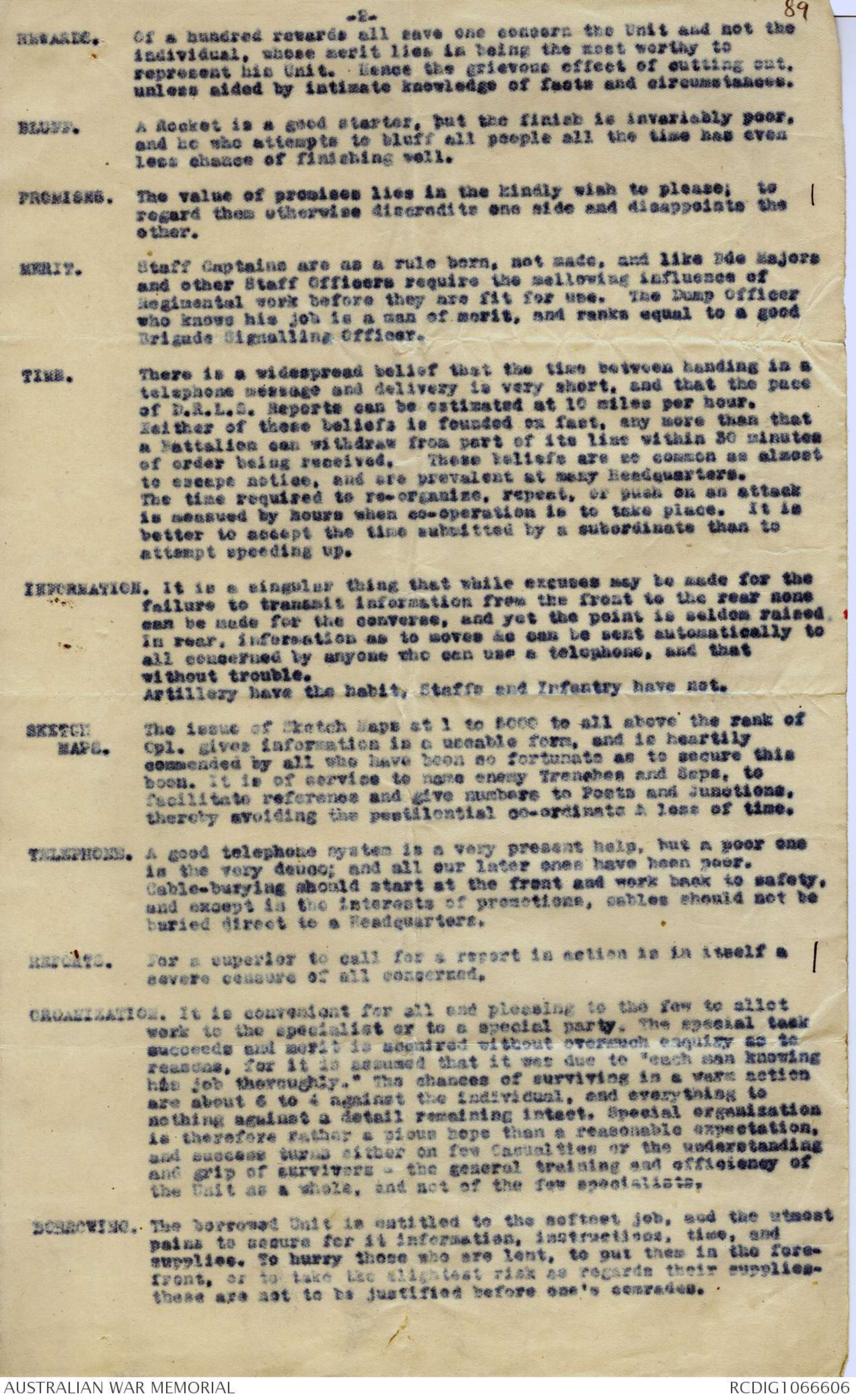
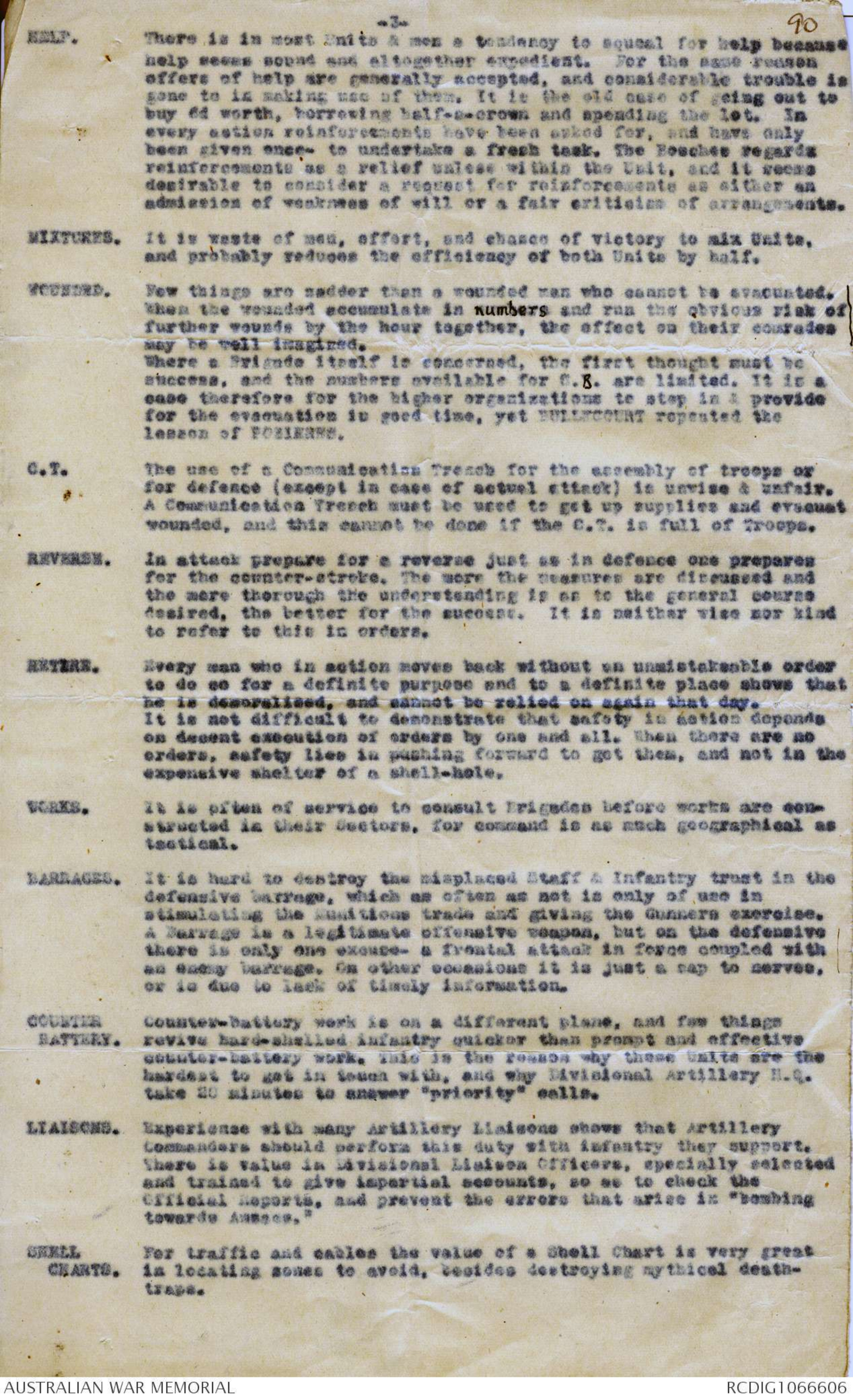
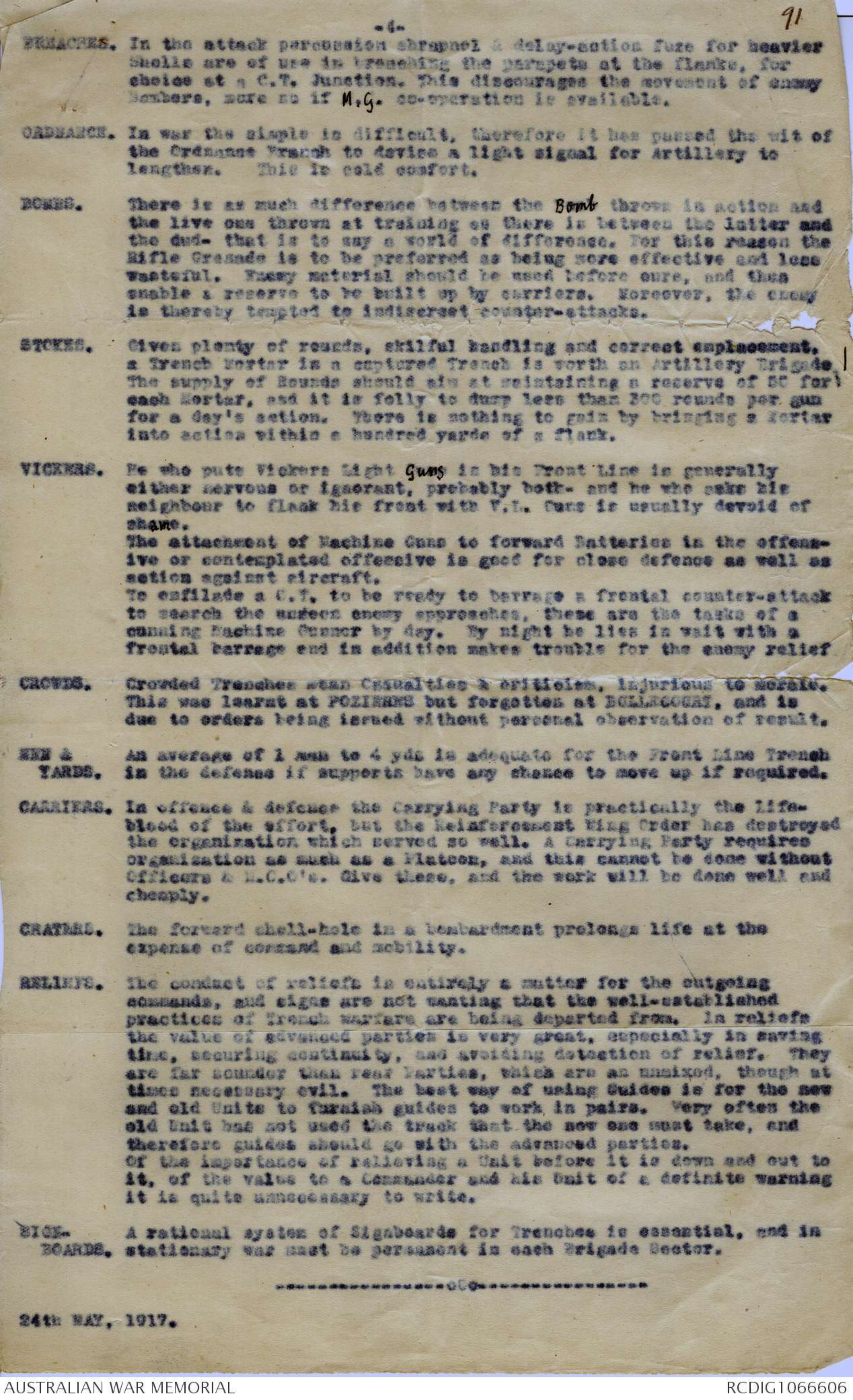
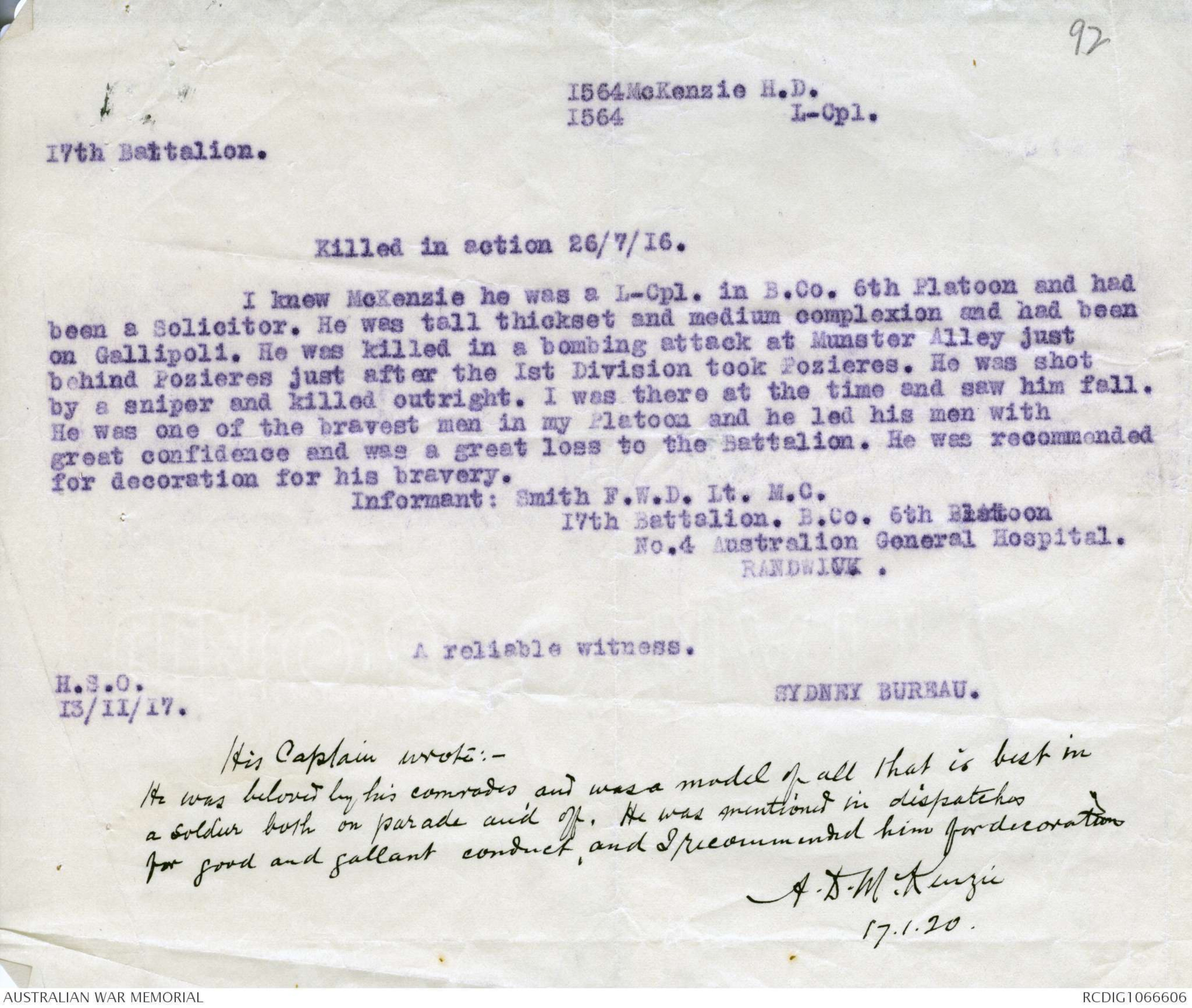
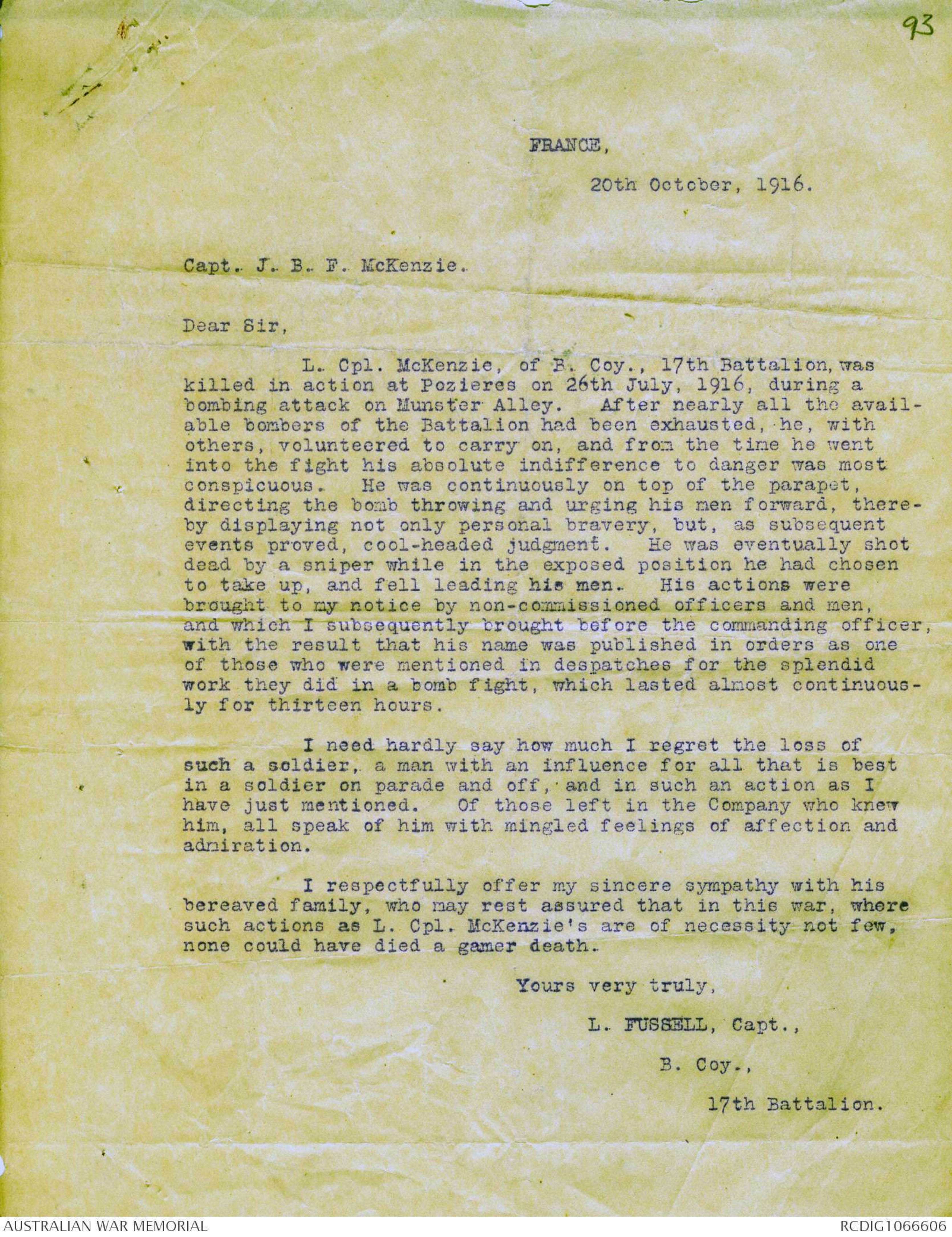
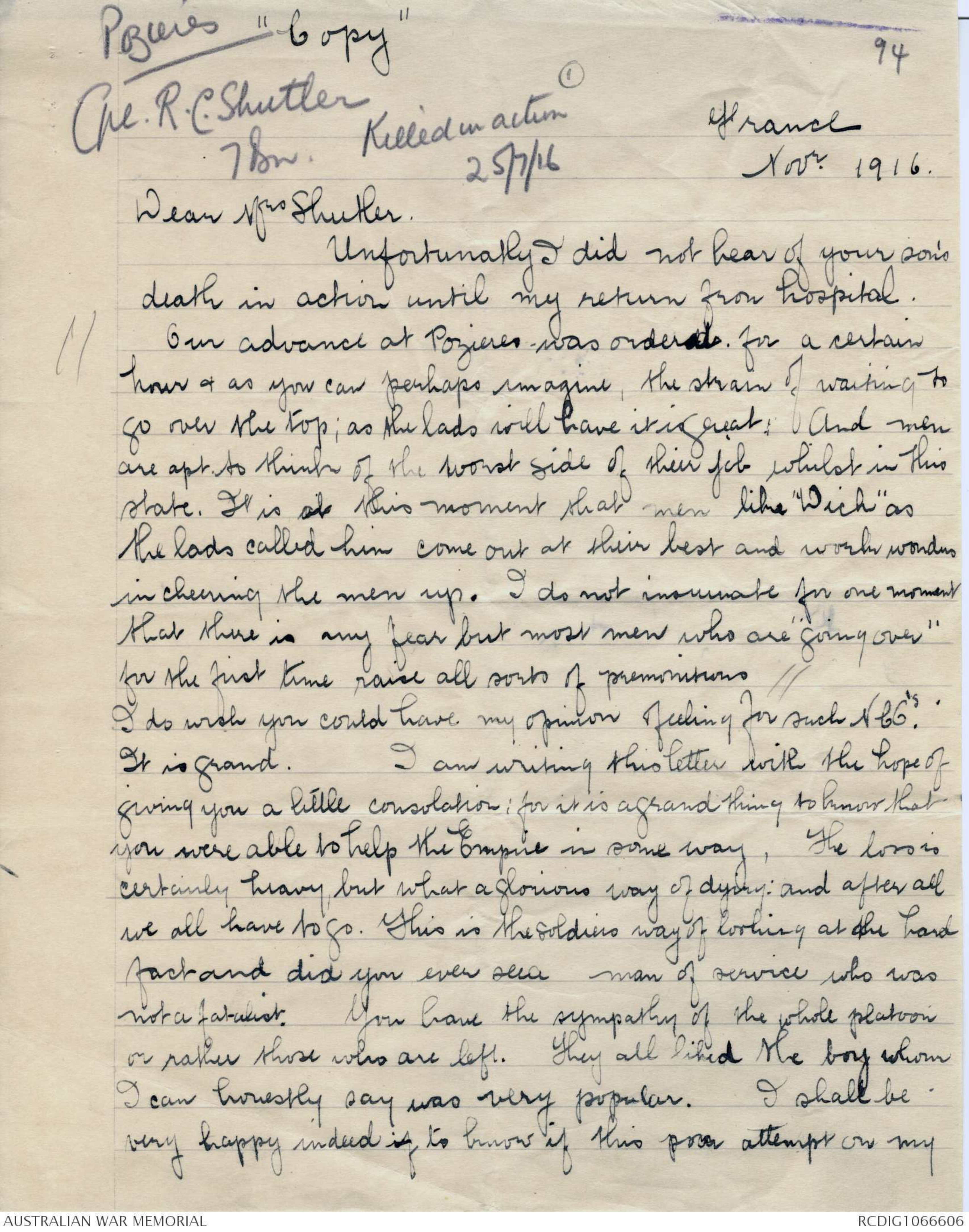
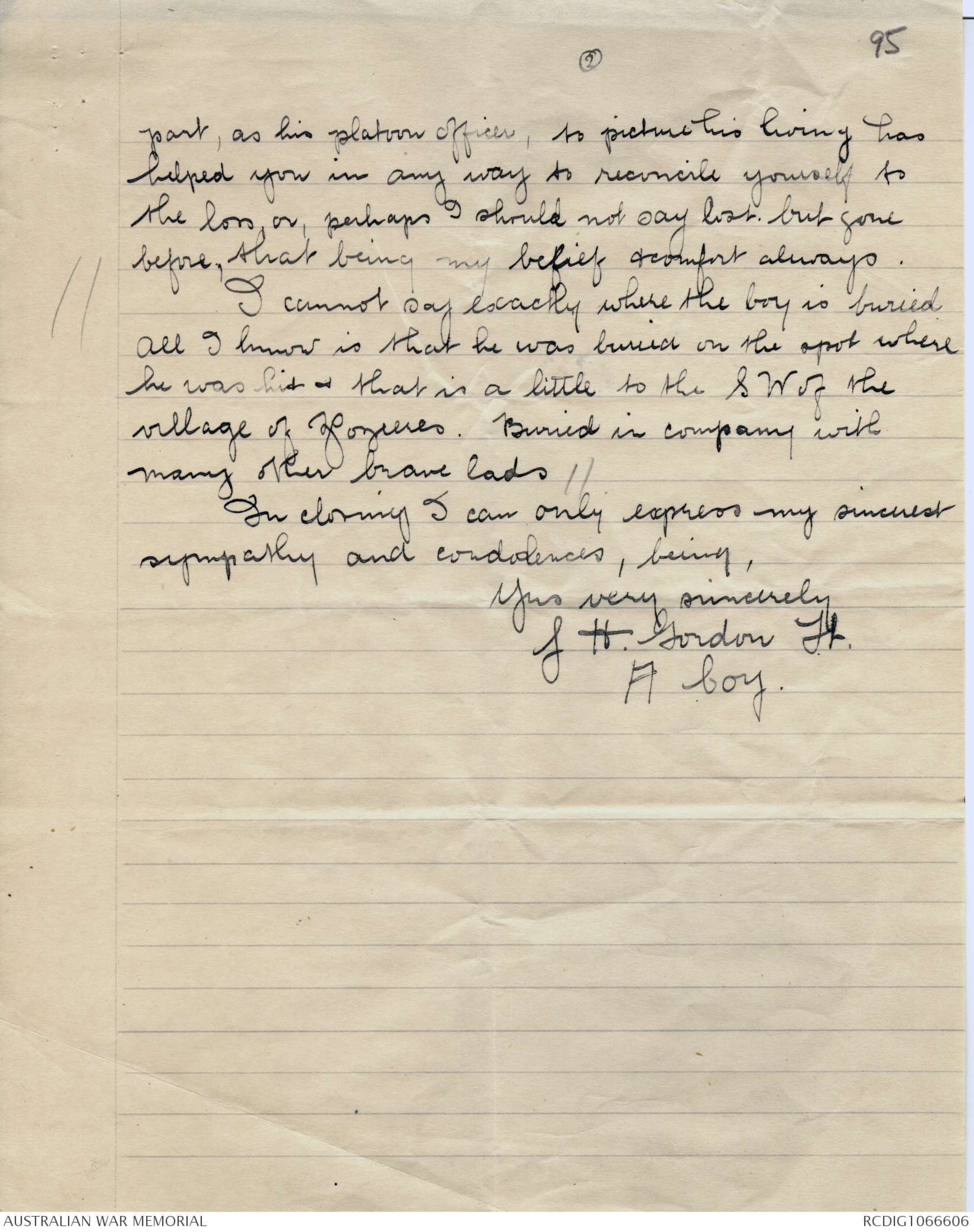
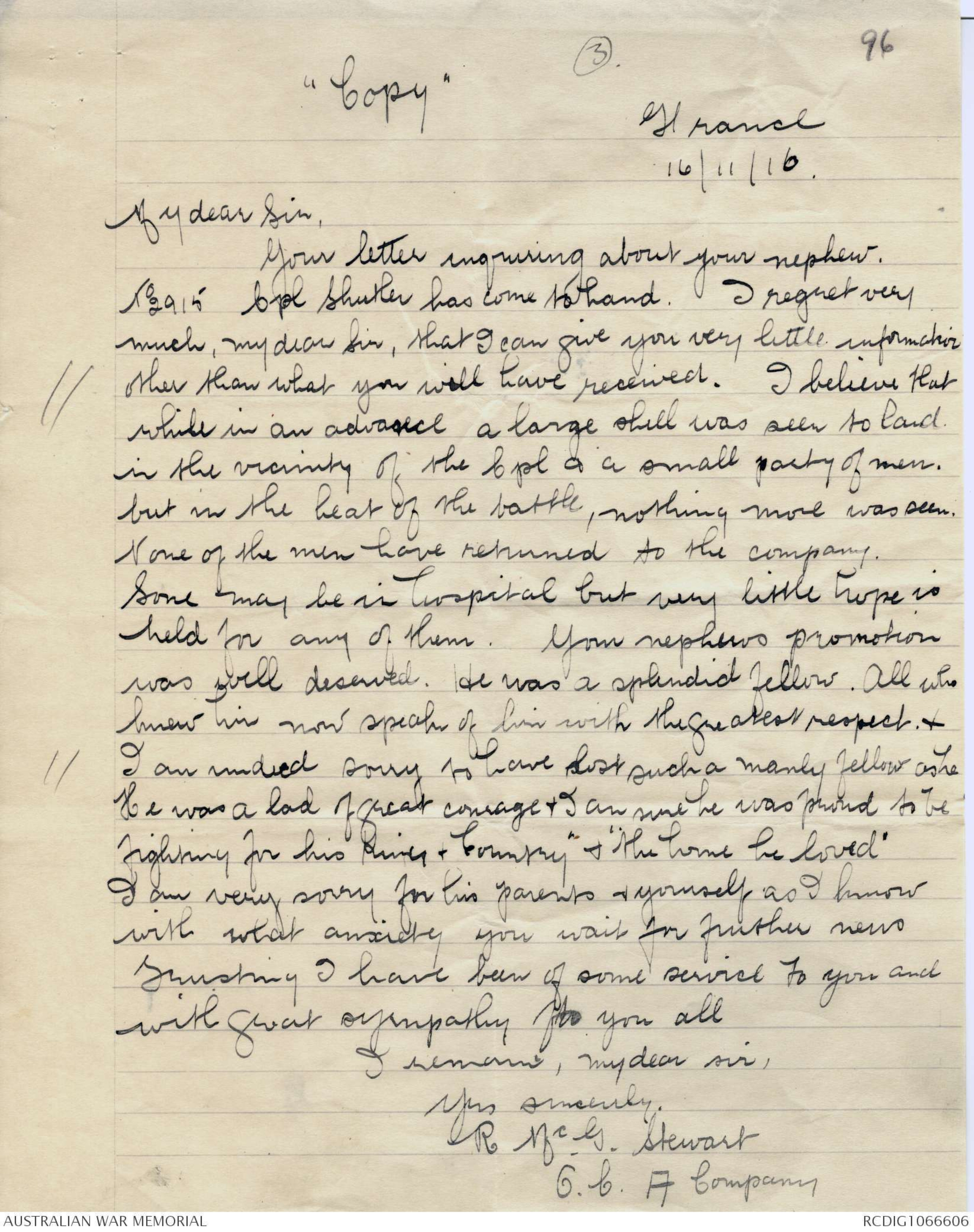
87
WREXHAM CORPORAL KILLED.
TOUCHING STORY OF HEROISM.
Corporal Rupert Allen Jones, son of Mr John
Jones, smith, of 61, Salop-road, Wrexham, has
been killed at the front. Corporal Jones, who
was 20 years of age, went to Australia two
years last March, and joined the "Anzacs" on
September 10, 1914. He fought throughout the
campaign in the Dardanelles, where he was
wounded twice. He subsequently suffered from
enteric, and after being treated in Lemnos
went to Egypt for the convalescent period. On
recovering he was stationed for a period at
Ismalia and Tel el Kebir, and afterwards went
to France.
The sad information was conveyed in letters
written to Mr Jones and also to his own parents
by Sergeant Stanley Thomas, son of Mr and
Mrs George Thomas, Mount-street, who went
to Australia with deceased and served with him
throughout. The letter to his home says: "Our
company was the first of the battalion to go
into action and Rup and I kept together all
day and managed to come through a big bombardment.
We were relieved in the evening,
and as there was a shortage of stretcher bearers
we brought back wounded with us. We got
a good way back and were going with our
stretchers through the ruins of a town when a
shell lobbed very near to us and Rup went
pretty near silly with shell-shock as well as
a slight wound in the head. We all dropped
when we heard the shell, and Rup took off his
steel helmet and covered the wounded man's
face with it and also shielded him with his
body. A flying piece of shell came along and
struck him on the back of the head. He came
running over to me and I roared to him to
never mind us but to get away as fast as he
could. We got our stretchers into the sap later
and I found Rup running up and down. I told
him to get out to the dressing station and away
he went. I got out of the trenches somehow
or other about 2 o'clock the following morning
and rested in a hole until 5 a.m. Something,
I don't know what, made me go back to the
communication trench, and there I found Rup
along with about five of his men. It seems
that he fell in with this party and they all
kept together, but just where I found them
they met some more men, and finding it was
over a mile back to our rendezvous , and being
dog weary, they decided to camp in the trench,
and soon afterwards were all killed. Rup was
hit by a big splinter across the groin. I buried
him, with the help of some pioneers, and we
made a cross and put it on the grave." After
dealing with some of his recent experiences the
writer adds "We all reckon here that if the
artillery of each side were to be cut out we
should soon finish off this war, for there is no
doubt about it that we could simply walk
through the German Infantry."
There is a brother of the deceased who is
serving in Egypt and another brother, who is
only aged 16, has served in the Royal Navy.
[*Cpl Jones ^(14 Bn) was killed ^at Pozieres on 7 Aug 1916*]
88
[*Confidential
(PRIVATE)
Notes on Somme & Ypres ^? Bullecout by BGen J.G. Gxxxellibrand.*]
"A" - PRELUDE
The Battles did not come as a surprise to the 6th Brigade,
which from end of July 1916 onwards was divided into the Quick,
the Dead, and London Anzacs.
"B" - ARRANGEMENT OF THE LESSONS LEARNT.
The numerous lessons learnt from these Battles have been noted
for future use, date not specified.
The causes of happenings, the methods of improvement,
experiences and lessons are set down as shortly as may be.
'C'- THE LESSONS.
KNOWLEDGE. Whosoever would handle troops in action must realise the personality
of his subordinates, appreciate their abilities (if any)
and judge their qualities. The degree naturally varies with the
Unit, for whilst higher formations must know more than whether
the spur or the brake is needed, the Platoon Commander should
know details such as how much beer or butter his men can hold.
Without this knowledge one cannot get 60% value out of the men
or Unit. This is the argument why an attached Battalion is a
misfortune, and the breaking up of Brigades, Field Companies,
Field Ambulances a nuisance and a loss of efficiency.
BELIEF. Verbal discussion arising from the daily visit of a Commander is
in most tactical situations a necessity, and cannot be replaced
by telephone talks. The man who talks face to face sees, knows
and is known - the man who telephones merely believes.
In practice it is indispensable to check the pictures others try
to paint on the mind by a sight of the reality, even at the cost
of undue influence by actualities, 5.9's included.
In view of the number of Officers now at a Divisional Headquarters,
the number of Divisional visits to a Brigade Headquarters
should average at least one in 5 days whilst the
Brigade is in the line.
WISDOM. Wise command, wise obedience, to understand and be understood;
herein lies the foundation of true discipline amongst men. The
average A.G. & A.P.M. variety is made of paper and smells of the
Office, fitter for a Reformatory than the Field. In the Field
discipline of the heart, mind and body determines the worth of
individual and Unit.
HONESTY. The man who "captures" a position or village when his troops
"occupy" it is wasted in the service - he should turn his hand
to Communiques.
To set out to attack and to end by establishing a defensive
flank is of merit only when an attack is thereby beaten off.
More often than not a "defensive flank" is a pleasant expression
meaning inaction.
PRIVILEGES It is the duty of every Commander to ensure by personal observation
that fighting, work, fatigue and other military privileges
are distributed as fairly as may be. Unless this is done there
can be no unity of Unit.
INACTION. It is a fond invention to think it a good and kind deed to allow
men to take things easy. Work is the best remedy for Shells.
PAPER. One conference before the issue of orders is worth three after,
saving both time and paper.
GOOD WORK. Within the permanent shell area of an operation few Commanders
are able to do more than 48 hours continuous work well.
CONDUCT. A cheerful Soldier is sorry for the enemy and rightly so, but
the gloomy doubter has a better right to be sorry for his men
and himself.
CASUALTIES Of all errors that of judging work by Casualties is unpardonable
for in most cases the best work is done cheaply and the worst
costs most. The loss of one Soldier is an abiding sorrow if due
to want of judgment, forethought, or care.
89
-2-
REWARDS. Of a hundred rewards all save one concern the Unit and not the
individual, whose merit lies in being the most worthy to
represent his Unit. Hence the grievous effect of cutting out,
unless aided by intimate knowledge of facts and circumstances.
BLUFF. A Rocket is a good starter, but the finish is invariably poor,
and he who attempts to bluff all people all the time has even
less chance of finishing well.
PROMISES. The value of promises lies in the kindly wish to please; to
regard them otherwise discredits one side and disappoints the
other.
MERIT. Staff Captains are as a rule born, not made, and like Bde Majors
and other Staff Officers require the mellowing influence of
Regimental work before they are fit for use. The Dump Officer
who knows his job is a man of merit, and ranks equal to a good
Brigade Signalling Officer.
TIME. There is a widespread belief that the time between handing in a
telephone message and delivery is very short, and that the pace
of D.R.L.S. Reports can be estimated at 10 miles per hour.
Neither of these beliefs is founded on fact, any more than that
a Battalion can withdraw from part of its line within 30 minutes
of order being received. These beliefs are so common as almost
to escape notice, and are prevalent at many Headquarters.
The time required to re-organise, repeat, or push on an attack
is measured by hours when co-operation is to take place. It is
better to accept the time submitted by a subordinate than to
attempt speeding up.
INFORMATION. It is a singular thing that while excuses may be made for the
failure to transmit information from the front to the rear none
can be made for the converse, and yet the point is seldom raised.
In rear, information as to moves &c can be sent automatically to
all concerned by anyone who can use a telephone, and that
without trouble.
Artillery have the habit, Staffs and Infantry have not.
SKETCH MAPS. The issue of Sketch Maps at 1 to 5000 to all above the rank of
Cpl. gives information in a useable form, and is heartily
commended by all who have been so fortunate as to secure this
boon. It is of service to name enemy Trenches and Saps, to
facilitate reference and give numbers to Posts and Junctions,
thereby avoiding the pestilential co-ordinates & loss of time.
TELEPHONE. A good telephone system is a very present help, but a poor one
is the very deuce; and all our later ones have been poor.
Cable-burying should start at the front and work back to safety,
and except in the interests of promotions, cables should not be
buried direct to a Headquarters.
REPORTS. For a superior to call for a report in action is in itself a
severe censure of all concerned.
ORGANIZATION. It is convenient for all and pleasing to the few to allot
work to the specialist or to a special party. The special task
succeeds and merit is acquired without overmuch enquiry as to
reasons, for it is assumed that it was due to "each man knowing
his job thoroughly." The chances of surviving in a warm action
are about 6 to 4 against the individual, and everything to
nothing against a detail remaining intact. Special organization
is therefore rather a pious hope than a reasonable expectation,
and success turns either on few Casualties or the understanding
and grip of survivors - the general training and efficiency of
the Unit as a whole, and not of the few specialists.
BORROWING. The borrowed Unit is entitled to the softest job, and the utmost
pains to secure for it information, instructions, time, and
supplies. To hurry those who are lent, to put them in the forefront,
or to take the slightest risk as regards their supplies -
these are not to be justified before one's comrades.
90
-3-
HELP. There is in most Units & men a tendency to squeal for help because
help seems sound and altogether expedient. For the same reason
offers of help are generally accepted, and considerable trouble is
gone to in making use of them. It is the the old case of going out to
buy 6d worth, borrowing half-a-crown and spending the lot. In
every action reinforcements have been asked for, and have only
been given once- to undertake a fresh task. The Bosches regards
reinforcements as a relief unless within the Unit, and it seems
desirable to consider a request for reinforcements as either an
admission of weakness of will or a fair criticism of arrangements.
MIXTURES. It is waste of men, effort, and chance of victory to mix Units,
and probably reduces the efficiency of both Units by half.
WOUNDED. Few things are sadder than a wounded man who cannot be evacuated.
When the wounded accumulate in numbers and run the obvious risk of
further wounds by the hour together, the effect on their comrades
may be well imagined.
Where a Brigade itself is concerned, the first thought must be
success, and the numbers available for S.B. are limited. It is a
case therefore for the higher organizations to step in & provide
for the evacuation in good time, yet BULLECOURT repeated the
lesson of POZIERES.
C.T. The use of a Communication Trench for the assembly of troops or
for defence (except in case of actual attack) is unwise & unfair.
A Communication Trench must be used to get up supplies and evacuate
wounded, and this cannot be done if the C.T. is full of Troops.
REVERSE. In attack prepare for a reverse just as in defence one prepares
for the counter-stroke. The more the measures are discussed and
the more thorough the understanding is as to the general course
desired, the better for the success. It is neither wise nor kind
to refer to this in orders.
RETIRE. Every man who is in action moves back without an unmistakable order
to do so for a definite purpose and to a definite place shows that
he is demoralised, and cannot be relied on again that day.
It is not difficult to demonstrate that safety in action depends
on decent execution of orders by one and all. When there are no
orders, safety lies in pushing forward to get them, and not in the
expensive shelter of a shell-hole.
WORKS. It is often of service to consult Brigades before works are constructed
in their Sectors, for command is as much geographical as
tactical.
BARRAGES. It is hard to destroy the misplaced Staff & Infantry trust in the
defensive barrage, which as often as not is only of use in
stimulating the munitions trade and giving the Gunners exercise.
A Barrage is a legitimate offensive weapon, but on the defensive
there is only one excuse- a frontal attack in force coupled with
an enemy barrage. On other occasions it is just a sap to nerves,
or is due to lack of timely information.
COUNTER BATTERY. Counter-Battery work is on a different plane, and few things
revive hard-shelled infantry quicker than prompt and effective
counter-battery work. This is the reason why these Units are the
hardest to get in touch with, and why Divisional Artillery H.Q.
take 20 minutes to answer "priority" calls.
LIAISONS. Experience with many Artillery Liaisons shows that Artillery
Commanders should perform this duty with infantry they support.
There is value in Divisional Liaison Officers, specially selected
and trained to give impartial accounts, so as to check the
Official Reports, and prevent the errors that arise in "bombing
towards Anzacs."
SHELL CHARTS. For traffic and cables the value of a Shell Chart is very great
in locating zones to avoid, besides destroying mythical death-traps.
91
-4-
BREACHES. In the attack percussion shrapnel & delay-action fuze for heavier
Shells are of use in breaching the parapets at the flanks, for
choice at a C.T. Junction. This discourages the movement of enemy
Bombers, more so if M.G. co-operation is available.
ORDNANCE. In war the simple is difficult, therefore it has passed the wit of
the Ordnance Branch to devise a light signal for Artillery to
lengthen. This is cold comfort.
BOMBS. There is as much difference between the Bomb thrown in action and
the live one thrown at training as there is between the latter and
the dud- that is to say a world of difference. For this reason the
Rifle Grenade is to be preferred as being more effective and less
wasteful. Enemy material should be used before ours, and thus
enable a reserve to be built up by carriers. Moreover, the enemy
is thereby tempted to indiscreet counter-attacks.
STOKES. Given plenty of rounds, skilful handling and correct emplacement,
a Trench Mortar in a captured Trench is worth an Artillery Brigade.
The supply of Rounds should aim at maintaining a reserve of 50 for
each Mortar, and it is folly to dump less than 300 rounds per gun
for a day's action. There is nothing to gain by bringing a Mortar
into action within a hundred yards of a flank.
VICKERS. He who puts Vickers Light Guns in his Front Line is generally
either nervous or ignorant, probably both- and he who asks his
neighbour to flank his front with V. L. Guns is usually devoid of
shame.
The attachment of Machine Guns to forward Batteries in the offensive
or contemplated offensive is good for close defence as well as
action against aircraft.
To enfilade a C.T. to be ready to barrage a frontal counter-attack
to search the unseen enemy approaches, these are the tasks of a
cunning Machine Gunner by day. By night he lies in wait with a
frontal barrage and in addition makes trouble for the enemy relief.
CROWDS. Crowded Trenches mean Casualties & criticism, injurious to morale.
This was learnt at POZIERES but forgotten at BULLECOURT, and is
due to orders being issued without personal observation of result.
MEN & YARDS. An average of 1 man to 4 yds is adequate for the Front Line Trench
in the defence if supports have any chance to move up if required.
CARRIERS. In offence & defence the Carrying Party is practically the life-blood
of the effort, but the Reinforcement Wing Order has destroyed
the organization which served so well. A Carrying Party requires
organization as much as a Platoon, and this cannot be done without
Officers & N.C.O's. Give these, and the work will be done well and
cheaply.
CRATERS. The forward shell-hole in a bombardment prolongs life at the
expense of command and mobility.
RELIEFS. The conduct of reliefs is entirely a matter for the outgoing
commands, and signs are not wanting that the well-established
practices of Trench warfare are being departed from. In reliefs
the value of advanced parties is very great, especially in saving
time, securing continuity, and avoiding detection of relief. They
are far sounder than rear Parties, which are an unmixed, though at
times necessary evil. The best way of using Guides is for the new
and old Units to furnish guides to work in pairs. Very often the
old Unit has not used the track that the new one must take, and
therefore guides should go with the advanced parties.
Of the importance of relieving a Unit before it is down and out to
it, of the value to a Commander and his Unit of a definite warning
it is quite unnecessary to write.
SIGNBOARDS. A rational system of Signboards for Trenches is essential, and in
stationary war must be permanent in each Brigade Sector.
24th MAY, 1917.
92
1564McKenzie H.D. L-Cpl.
1564
17th Battalion.
Killed in action 26/7/16.
I knew McKenzie he was a L-Cpl. in B.Co. 6th Platoon and had
been a Solicitor. He was tall thickset and medium complexion and had been
on Gallipoli. He was killed in a bombing attack at Munster Alley just
behind Pozieres just after the 1st Division took Pozieres. He was shot
by a sniper and killed outright. I was there at the time and saw him fall.
He was one of the bravest men in my Platoon and he led his men with
great confidence and was a great loss to the Battalion. He was recommended
for decoration for his bravery,
Informant: Smith F.W.D. Lt. M.C.
17th Battalion. B.Co. 6th Platoon
No.4 Australian General Hospital.
RANDWICK.
A reliable witness.
H.S.O. SYDNEY BUREAU.
13/11/27.
[*His Captain wrote:-
He was beloved by his comrades and was a model of all that is best in
a soldier both on parade and off. He was mentioned in dispatches
for good and gallant conduct, and I recommended him for decoration
A.D.McKenzie
17.1.20.*]
93
FRANCE,
20th October, 1916.
Capt. J. B. F. McKenzie.
Dear Sir,
L. Cpl. McKenzie, of B. Coy., 17th Battalion, was
killed in action at Pozieres on 26th July, 1916, during a
bombing attack on Munster Alley. After nearly all the available
bombers of the Battalion had been exhausted, he, with
others, volunteered to carry on, and from the time he went
into the fight his absolute indifference to danger was most
conspicuous. He was continuously on top of the parapet,
directing the bomb throwing and urging his men forward, thereby
displaying not only personal bravery, but, as subsequent
events proved, cool-headed judgment. He was eventually shot
dead by a sniper while in the exposed position he had chosen
to take up, and fell leading his men. His actions were
brought to my notice by non-commissioned officers and men,
and which I subsequently brought before the commanding officer,
with the result that his name was published in orders as one
of those who were mentioned in despatches for the splendid
work they did in a bomb fight, which lasted almost continuously
for thirteen hours.
I need hardly say how much I regret the loss of
such a soldier, a man with an influence for all that is best
in a soldier on parade and off, and in such an action as I
have just mentioned. Of those left in the Company who knew
him, all speak of him with mingled feelings of affection and
admiration.
I respectfully offer my sincere sympathy with his
bereaved family, who may rest assured that in this war, where
such actions as L. Cpl. McKenzie’s are of necessity not few,
none could have died a gamer death.
Yours very truly,
L. FUSSELL, Capt.,
B. Coy.,
17th Battalion.
94
[*Pozieres
"Copy"
1
Cpl. R. C. Shutler
7 Bn.
Killed in action
25/7/16*]
France
Novr 1916.
Dear Mrs Shutler.
Unfortunatly I did not hear of your son's
death in action until my return from hospital.
Our advance at Pozieres was ordered for a certain
hour & as you can perhaps imagine, the strain of waiting to
go over the top; as the lads will have it is great. And men
are apt to think of the worst side of their job whilst in this
state. It is at this moment that men like "Dick" as
the lads called him come out at their best and work wonders
in cheering the men up. I do not insinuate for one moment
that there is any fear but most men who are "going over"
for the first time raise all sorts of premonitions //
I do wish you could have my opinion & feeling for such N.C.O's.
It is grand. I am writing this letter with the hope of
giving you a little consolation; for it is a grand thing to know that
you were able to help the Empire in some way, The loss is
certainly heavy, but what a glorious way of dying: and after all
we all have to go. This is the soldiers way of looking at the hard
fact and did you even see a man of service who was
not a fatalist. You have the sympathy of the whole platoon
or rather those who are left. They all liked the boy whom
I can honestly say was very popular. I shall be
very happy indeed if to know if this poor attempt on my
95
2
part, as his platoon officer, to picture his living has
helped you in any way to reconcile yourself to
the loss, or, perhaps I should not say lost. but gone
before, that being my belief & comfort always.
I cannot say exactly where the boy is buried.
All I know is that he was buried on the spot where
he was hit - that is a little to the S W of the
village of Pozieres. Buried in company with
many other brave lads //
In closing I can only express my sincerest
sympathy and condolences, being,
Yrs very sincerely
L.H. Gordon Lt.
A Coy.
96
3
"Copy"
France
16/11/16.
My dear Sir,
Your letter inquiring about your nephew.
To2915 Cpl Shutler has come to hand. I regret very
much, my dear Sir, that I can give you very little information
other than what you will have received. I believe that
while in an advance a large shell was seen to land.
in the vicinity of the Cpl & a small party of men.
but in the heat of the battle, nothing more was seen.
None of the men have returned to the company.
Some may be in hospital but very little hope is
held for any of them. Your nephews promotion
was well deserved. He was a splendid fellow. All who
knew him now speak of him with the greatest respect. &
I am indeed sorry to have lost such a manly fellow as he
He was a lad of great courage & I am sure he was proud to be
fighting for his King & Country & "the home he loved"
I am very sorry for his parents & yourself as I know
with what anxiety you wait for further news
Trusting I have been of some service to you and
with great sympathy to you all
I remain, my dear sir,
Yrs sincerely,
R Mc.G. Stewart
O.C. A Company
 Deb Parkinson
Deb ParkinsonThis transcription item is now locked to you for editing. To release the lock either Save your changes or Cancel.
This lock will be automatically released after 60 minutes of inactivity.